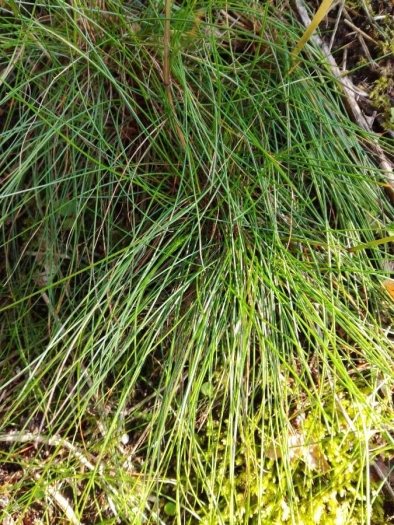Wavy Hairgrass
(Avenella flexuosa)
Wavy Hairgrass (Avenella flexuosa)
/
/

Hélène
CC BY-SA 4.0
Image By:
Hélène
Recorded By:
Copyright:
CC BY-SA 4.0
Copyright Notice:
Photo by: Hélène | License Type: CC BY-SA 4.0 | License URL: https://creativecommons.org/licenses/by-sa/4.0/ | Attribution: Hélène (cc-by-sa) | Rights Holder: Hélène | Publisher: PlantNet | Date Created: 2020-06-17T17:06:54Z | Title: Avenella flexuosa (L.) Drejer: leaf | Notes: |



















































Estimated Native Range
Summary
Avenella flexuosa, commonly known as Wavy Hairgrass, is an evergreen perennial grass native to a variety of habitats including open grasslands, heathlands, and the understory of deciduous and coniferous forests across North America and Eurasia, extending from Greenland through Central and Eastern U.S.A., and from Southern South America to the Falkland Islands. It typically forms tufts or clumps reaching 20-60 cm in height, with fine-textured, wiry leaves that have a distinctive wavy appearance. The inflorescences are subtle, with small, greenish to purplish flowers that bloom in late spring to summer, and are not particularly showy. However, the plant’s overall texture and form can add visual interest to a garden setting.
Wavy Hairgrass is valued for its adaptability to acidic soils and its ability to thrive in part shade, making it suitable for woodland gardens, rock gardens, and as a ground cover in acidic soil areas. It is also used for erosion control on slopes due to its clumping growth habit. While it prefers moist, well-drained soils, it can tolerate a degree of dryness once established. Gardeners should be aware that in optimal conditions, it can self-seed and spread, potentially becoming invasive. To maintain its appearance, it may require occasional division.CC BY-SA 4.0
Wavy Hairgrass is valued for its adaptability to acidic soils and its ability to thrive in part shade, making it suitable for woodland gardens, rock gardens, and as a ground cover in acidic soil areas. It is also used for erosion control on slopes due to its clumping growth habit. While it prefers moist, well-drained soils, it can tolerate a degree of dryness once established. Gardeners should be aware that in optimal conditions, it can self-seed and spread, potentially becoming invasive. To maintain its appearance, it may require occasional division.CC BY-SA 4.0
Plant Description
- Plant Type: Grass
- Height: 2-3 feet
- Width: 1-2 feet
- Growth Rate: Moderate
- Flower Color: N/A
- Flowering Season: Spring
- Leaf Retention: Evergreen
Growth Requirements
- Sun: Part Shade
- Water: Medium
- Drainage: Fast, Medium
Common Uses
Drought Tolerant, Fire Resistant, Low Maintenance, Potted Plant, Rock Garden
Natural Habitat
Native to open grasslands, heathlands, and the understory of deciduous and coniferous forests
Other Names
Common Names: Bølget Bunke, Drahtschmiele, Metsälauha, Smyle, Bochtige Smele, Kruståtel, Sia, Crinkled Hair Grass
Scientific Names: , Deschampsia flexuosa, Avenella flexuosa, Aira flexuosa, Lerchenfeldia flexuosa, Avena flexuosa, Aira montana, Avenella rubra, Deschampsia flexuosa var. grandiflora, Deschampsia flexuosa f. flavescens
GBIF Accepted Name: Avenella flexuosa (L.) Drejer